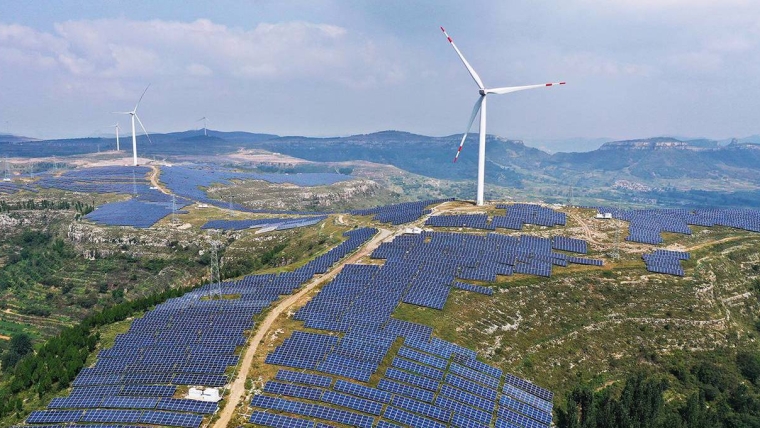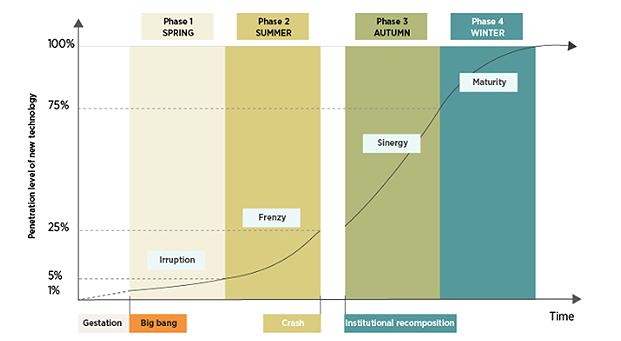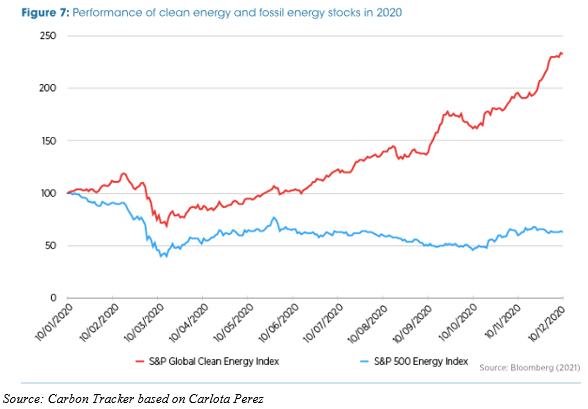
For decades, we at the Rocky Mountain Institute (now RMI) have argued that the transition to clean energy will cost less and proceed faster than governments, firms, and many analysts expect. In recent years, this outlook has been fully vindicated: costs of renewables have consistently fallen faster than expected, while deployment has proceeded more rapidly than predicted, thereby reducing costs even further.
Thanks to this virtuous cycle, renewables have broken through. And now, new analyses from two authoritative research institutions have added to the mountain of data showing that a rapid clean-energy transition is the least expensive path forward.
Policymakers, business leaders, and financial institutions urgently need to consider the promising implications of this development. With the United Nations Climate Change Conference (COP26) in Glasgow fast approaching, it is imperative that world leaders recognize that achieving the Paris climate agreement’s 1.5° Celsius warming target is not about making sacrifices; it is about seizing opportunities. The negotiation process must be reframed so that it is less about burden-sharing and more about a lucrative race to deploy cleaner, cheaper energy technologies.
With the world already suffering from climate-driven extreme weather events, a rapid clean-energy transition also has the virtue of being the safest route ahead. If we fail at this historic task, we risk not only wasting trillions of dollars but also pushing civilization further down a dangerous and potentially catastrophic path of climate change.
One can only guess why forecasters have, for decades, underestimated the falling costs and accelerating pace of deployment for renewables. But the results are clear: bad predictions have underwritten trillions of dollars of investment in energy infrastructure that is not only more expensive but also more damaging to human society and all life on the planet.
We now face what may be our last chance to correct for decades of missed opportunities. Either we will continue to waste trillions more on a system that is killing us, or we will move rapidly to the cheaper, cleaner, more advanced energy solutions of the future.
New studies have shed light on how a rapid clean-energy transition would work. In the International Renewable Energy Agency (IRENA) report The Renewable Spring, lead author Kingsmill Bond shows that renewables are following the same exponential growth curve as past technology revolutions, hewing to predictable and well-understood patterns.
Accordingly, Bond notes that the energy transition will continue to attract capital and build its own momentum. But this process can and should be supported to ensure that it proceeds as quickly as possible. Policymakers who want to drive change must create an enabling environment for the optimal flow of capital. Bond clearly lays out the sequence of steps that this process entails.

Examining past energy revolutions reveals several important insights. First, capital is attracted to technological disruptions, and tends to flow to the areas of growth and opportunity associated with the start of these revolutions. As a result, once a new set of technologies passes its gestation period, capital becomes widely available. Second, financial markets draw forward change. As capital moves, it speeds up the process of change by allocating new capital to growth industries, and by withdrawing it from those in decline.
The current signals from financial markets show that we are in the first phase of a predictable energy transition, with spectacular outperformance by new energy sectors and the de-rating of the fossil-fuel sector. This is the point where wise policymakers can step in to establish the necessary institutional framework to accelerate the energy transition and realize the economic benefits of building local clean-energy supply chains. As we can see from market trends highlighted in the IRENA report, the shift is already well underway.

Reinforcing the findings from the IRENA report, a recent analysis from the Institute for New Economic Thinking (INET) at the Oxford Martin School shows that a rapid transition to clean energy solutions will save trillions of dollars, in addition to keeping the world aligned with the Paris agreement’s 1.5°C goal. A slower deployment path would be financially costlier than a faster one and would incur significantly higher climate costs from avoidable disasters and deteriorating living conditions.
Owing to the power of exponential growth, an accelerated path for renewables is eminently achievable. The INET Oxford report finds that if the deployment of solar, wind, batteries, and hydrogen electrolyzers continues to follow exponential growth trends for another decade, the world will be on track to achieve net-zero-emissions energy generation within 25 years.
In its own coverage of the report, Bloomberg News suggests as a “conservative estimate” that a rapid clean-energy transition would save $26 trillion compared with continuing with today’s energy system. After all, the more solar and wind power we build, the greater the price reductions for those technologies.
Moreover, in his own response to the INET Oxford study, Bill McKibben of 350.org points out that the cost of fossil fuels will not fall, and that any technological learning curve advantage for oil and gas will be offset by the fact that the world’s easy-access reserves have already been exploited. Hence, he warns that precisely because solar and wind will save consumers money, the fossil-fuel industry will continue to try to slow down the transition in order to mitigate its own losses.
We must not allow any further delay. As we approach COP26, it is essential that world leaders understand that we already have cleaner, cheaper energy solutions ready to deploy now. Hitting our 1.5°C target is not about making sacrifices; it is about seizing opportunities. If we get to work now, we can save trillions of dollars and avert the climate devastation that otherwise will be visited upon our children and grandchildren.
Jules Kortenhorst is CEO of RMI. Copyright: Project Syndicate, 2021, and published here with permission.
35 Comments
Let's see, the oil companies lobby the governments and enrich politicians, while the governments earn lots of tax money from the oil companies and oil users i.e. consumers, etc. Yet the only body that could effect significant change from fossil fuels to renewables is... the governments of the world.
Soooo.... seems to be a bit of a conundrum here.
Unfortunately, the RMI article is essentially a lobbying and propaganda piece, and the timing just before COP26 is probably not coincidental. The authors knew their message at the start, and then organised supposed facts to align with this. In saying that, I am not in any way arguing against renewable energy, but I am saying that lobbying and propaganda that misleads does not contribute to an informed debate.
KeithW
Agreed, Keith. They have peddled this line for decades, as McKibben has done globally and Sims has done here. They are right in that we have to face life without fossil energy; it has been leaving us since we started in on it - always happens with finite stocks.
But they are wrong claiming that renewables can be 'cheaper', given that energy underwrites wealth. The quality of renewable energy is not as good as for FF, by a long measure. The resource-stocks to do the build do not exist, and the build would take more fossil energy (just contemplate replacing ALL of the FF infrastructure - all those diggers, all those trucks - within a few years) than we can safely burn.
The only way is to stop using so much energy. To reduce by several orders of magnitude, what we do. If we want to keep doing what we are doing, we need to address population urgently - because this is totally a er-head issue (I suspect war(s) will overtake that discussion). And we need to ask what kind of life is possible beyond this bottleneck? what parts of culture we can retain? And how much of the social construct we need to relinquish, given that it was surplus-energy-supported.
Nuclear needs to be a big part of the mix too. Wind and solar aren't reliable enough and use up large areas of land.
Yes Nuclear is an essential requirement to keep the lights on. However it will never happen without a major shift in public opinion consequently will almost certainly need to suffer a period of frequent on prolonged blackouts and brownouts before common sense emerges and the alarmism subsides.
We don't have the use to justify the cost.
Solar and wind are definitely cheaper for new installations although intermittency needs to be managed
The problem we need to solve is not just implementing renewables for new generation but replacing all the existing fossil fuel generation - it is not economical to replace an existing asset with a new one unless it is end of life (no pun intended).
Somewhat true at a worldwide level, but at that of NZ Inc.We require a huge increase in electric generation, have little dirty generation. Our issue is suitability of electric and hydrogen fueled vehicles to replace fleets, shipping and aircraft.
And yet there are massive energy crises all around the world, and coal prices are at their all time high....You can look at what they say, and you can look at what is actually happening.
Mainly due to transport issues / covid. Coal dropped from $ 120 per ton in 2010 , to $50 -60 per ton for all of 2020, yes it has risen risen in 2021 , as with all commodities. I expect it will drop just as rapidly.
All the more reason to be self sufficient in power production. Let's not forget the cost of maintaining oil and gas supplies from overseas. Invested interest don't want us to be self sufficient not much money to be made.
What does renewable actually mean? .
85% (or last I looked) of energy comes from fossils and the balance comes from generation that is made from the energy of fossils. It's only the bit at the end (the wind/sun) that's renewable.
A windmill might last 20 years. It needs replacing, it needs servicing, it needs building in the first place. I.E it requires oil and coal.
Everywhere we look has been built from fossils and it's all decaying and needs replacing.
The life cycle and the maintenance is simply not being factored into renewables, not to mention the recycling is a big problem. The best power source appears to me to be Hydro and perhaps we can build a nuclear power station in Huntly as the ideal spot for one.
LCOE accounts for lifecycle costs so is factored in to renewables. We are lucky that recycling is the issue - have you tried recycling coal? Recycling also tends to come later in the cycle once a significant body of material is available to be recycled. You don't build recycling when there is nothing to be recycled yet.
To combat the energy crisis, scrap the Green New Deal and revive industrial civilization
The obsession with decarbonization has resulted in financially prohibitive carbon credits (a form of modern sin tax) as suppliers and users of dirty backup energy increase. Meanwhile, several U.K. energy supply firms have gone bankrupt, increasing scarcity even more in this vicious feedback loop.
Translated: revive a construct totally dependent on burning our way through a finite resource - the best half of which we have ALREADY burnt.
Yeah, that's a winner.
The ‘German Disease’
Now after 20 years of foolish investment into solar and wind, Germany, the once-flagship of EU industry, is a victim of what we can call the German Disease. Like the economic Dutch Disease, the forced investment into Green Energy has resulted in the lack of reliable affordable energy. All for an unproven 1.5C claim of IPCC that is supposed to end our civilization by 2050 if we fail to reach Zero Carbon.
To advance that EU Green Energy agenda, country after country with a few exceptions have begun dismantling oil, gas and coal and even nuclear. Germany’s last remaining nuclear plants will permanently close next year. New coal plants, with latest state-of-art scrubbers, are being scrapped even before being started.
The German case gets even more absurd.
In 2011 the Merkel government took an energy model developed by Martin Faulstich and the state Advisory Council on the Environment (SRU) which claimed that Germany could attain 100% renewable electricity generation by 2050. They argued that using nuclear longer would not be necessary, nor the construction of coal-fired plants with carbon capture and storage (CCS). With that, Merkel’s catastrophic Energiewende was born. The study argued, it would work because Germany could contract to buy surplus, CO2-free, hydro-electric power from Norway and Sweden.
Now with extreme drought and a hot summer, the hydropower reserves of Sweden and Norway are dangerously low coming into winter, only 52% of capacity. That means the electric power cables to Denmark, Germany and now UK are in danger. And to make it worse, Sweden is split on shutting its own nuclear plants which give it 40% of electricity. And France is debating cutting as much as one-third of its clear nuclear plants meaning that source for Germany will also not be sure.
Already on January 1, 2021 because of a German government mandated coal phase-out, 11 coal-fired power plants with a total capacity of 4.7 GW were shut down. It lasted only 8 days when several of the coal plants had to be reconnected to the grid due to a prolonged low-wind period. In 2022 the last German nuclear plant will shut and more coal plants will permanently close, all for the green nirvana. In 2002 German nuclear power was source for 31% of power, carbon-free electric power.
As for wind power making up the deficit in Germany, in 2022 some 6000 wind turbines with an installed capacity of 16 GW will be dismantled due to the expiration of feed-in subsidies for older turbines. The rate of new wind farm approvals is being blocked by growing citizen rebellion and legal challenges to the noise pollution and other factors. An avoidable catastrophe is in the making.
The response from the EU Commission in Brussels, rather than admit the glaring flaws in their Green Energy agenda, has been to double down on it as if the problem were natural gas and coal. EU Climate Czar Frans Timmermans absurdly declared, “Had we had the green deal five years earlier, we would not be in this position because then we would have less dependency on fossil fuels and natural gas.”
If the EU continues with that suicidal agenda, it will find itself in a deindustrialized wasteland in a few short years. The problem is not gas, coal or nuclear. It is the inefficient Green Energy from solar and wind that will never be able to offer stable, reliable power.
The Green Energy Agenda of the EU, US and other governments along with the Davos-promoted ESG investing will only guarantee that as we go forward there will be even less gas or coal or nuclear to fall back on when the wind stops, there is a drought in hydroelectric dams or lack of sunshine. It doesn’t take a rocket scientist to realize this is a road to economic destruction. But that’s in fact the goal of the UN 2030 “sustainable” energy or the Davos Great Reset: population reduction on a massive scale. We humans are the frogs being slowly boiled. And now the Powers That Be are really turning the heat up. - Link
Jeez, your extensive knowledge of finance doesn't help you understand physics then?!?
Does a BSc Hons count?
Audaxes,
Can I ask what you would advocate be done? In asking that, i am making the assumption that you believe there is a problem there to be solved.
The problems I see are an increasingly unstable global climate, that fossil fuels and the many metals and minerals which we mine will run out at some point and are increasingly expensive to obtain and process-a declining EROI- a still growing global population many of whom aspire to a Western lifestyle and an ever deteriorating environment. Something somewhere has got to give.
It is quite clear from the UNEP Production Gap Report, that the major fossil fuel producers and miners fully intend to ramp up production to 2030 and beyond. The 1.50% figure is already out of reach and at least 2% is likely.
My answer would be roughly this; we must begin to prepare for a different world; a much less globalised world, a world in which rampant consumerism no loner holds sway.
Classic answer.
That very much depends what you learned! I went from physics hons into environmental masters and worked in that space for years (water, waste, power etc).
Every significant environmental improvement of the last 100 years has happened *because* of state interference, sin taxes, regulation etc - public sanitation, tackling ozone depletion, reducing pollution from power plants, hazardous waste reductions, fuel efficiency regulations etc. I don't disagree that the EU are messing things up, but what we are witnessing here is a mass exodus from fossil fuels as companies and the finance sector realise that fossil fuel infrastructure will be stranded assets far sooner than they thought, and the Saudis and Russians realise they need to maximise gains over the next ten years. The idea that this is some kind of Davos conspiracy to reduce population levels as part of some grand reset is well below the par of your usual contributions. Govts should be leaning into the challenge of managing that adjustment.
For those that advocate nuclear energy is the answer I recommend Dr Helen Caldicotts book "nuclear is not the answer " 2006 . The problem I have with nuclear is that a badly run or risky plant when it goes wrong , think Chernobyl, Fukushima, it affects many more people than those of the country involved the risk is not borne by those that benefit from it . If Australia, for example , was to set up nuclear plants and one fails the weather patterns would drop the fallout on nz , also it is not a matter of a week or two cleanup it will take thousands of years to become safe or usable again , if we think agricultural land is scarce now imagine if a few of these failures occurred in prime agricultural areas eg huntly which somebody suggested.
Nuclear is likely to become the only solution. Everything carries risk. Burning coal clearly has risk and a number of countries are beginning to suffer in a major way. There will come a point where it will become a choice of the lesser of the two evils.
New reactor designs are much safer and the older ones will be decommissioned over time (they have also improved safety measures). There are hundreds of old design reactors that haven't had any problems. With Chernobyl there was initial fallout but it was contained so it wasn't the thousands of years issue you're making out. There have been a lot less deaths caused by nuclear than any other energy source.
You've said nuclear isn't the answer but you haven't provided what you think is the answer. What do you think the answer is?
The answer has to lie in renewable energy as nuclear has substantial unsolved problems like getting rid of the waste , once again you have very long terms to deal with its toxicity. Chernobyl has not been contained the concrete it was coated in has cracks and needs repairs . You still cannot live in the area and are unlikely to be able to for some time . Pumped hydro as proposed down south appears feasible, the Aussies already have one under construction. No matter how much they improve the design you still have human error which never fails to make something infallible, fallible. The cost of nuclear is incredibly expensive and unlikely to ever fit nzs budget .
The nuclear technologies of the future are very different to Chernobyl-type reactors and are likely to use molten salt thorium reactors. The Chinese are now leading in regard to these technologies and are currently bringing online the first semi commercial albeit small (2MW) reactor. These are much safer ( they cannot blow up) and have less waste issues (the radioactive waste is short lived). These will be a key part of the future but we are not quite there yet.
KeithW
No they won't, Keith.
They rely on the FF infrastructure, including relying on the financial system remaining intact (which below a certain EROEI level - which I suggest we've transgressed - it won't). They rely on workers getting ' paid' etc. We are already facing unrepayable debt; how long does belief in repayability remain?
And they're to support the current appraisal of society - and one thing is 100% guaranteed; current society is not going to continue. It was based on linear draw-down, as you well know. Lord Rees was right two decades ago; we have to go with existing technologies (and we had to go ' then').
You forgot to mention the second major gas pipe currently under construction from Russia to Germany. This is the problem with "Green Energy" its just smoke and mirrors, the problems are hidden or else they just become someone else's problems, the old see no evil, hear no evil.
Like California. They ban fossil fuel use to generate electricity, then when they need it they just buy it from their neighbouring states....who produce it all with fossil fuels. Hypocrisy and virtue signaling at its best.
Somebody needs to tell Andrew Forest that he has just committed Fortescue Metals to a green hydrogen future I am sure he did substantial research before that committment Andrew also stated that net zero is smoke and mirrors it needs to be ZERO full stop the rest is accounting chicanery.
Now, all the Rocky Mountain Institute needs to do is nudge China and India on board....
That will be a Mountain Climb indeed: bring popcorn....
China is leading in terms of both molten salt thorium reactors and solar technology. But with 1.4 billion people with energy requirements the journey is long.
KeithW
Green investments are like a pyramid schemes. The late comers pay the earlier money for investments in the construction only to realise that the ROI were worse off post construction compared to fossil. The feel good factor doesn't compensate the investors unless the investors derived their initial investment capital through feel good. To add on to the injury, every green initiative has an unintended consequential negative impact on the environment- think of how hyro dams impacts ecology while becoming a flood bomb, moving wildlife from deserts (killing them) just to build enough solar panels.
Greenification for the climate change narrative is a zero sum game, its funding is a pyramid scheme.
I would rather invest in fossils.
moving wildlife from deserts (killing them) just to build enough solar panels. okayyyyyyyyyy.ets ignore the wildlife killed by oil spills , acid rain etc while we are at it .
how can it be a pyramid scheme , when the cost of solar panels is coming rapidly. the return is getting better by the day , commercial solar already has a ROI in double digits.Residential is a bit more problematic , in that most people don't use much power during daylight hours.

We welcome your comments below. If you are not already registered, please register to comment
Remember we welcome robust, respectful and insightful debate. We don't welcome abusive or defamatory comments and will de-register those repeatedly making such comments. Our current comment policy is here.